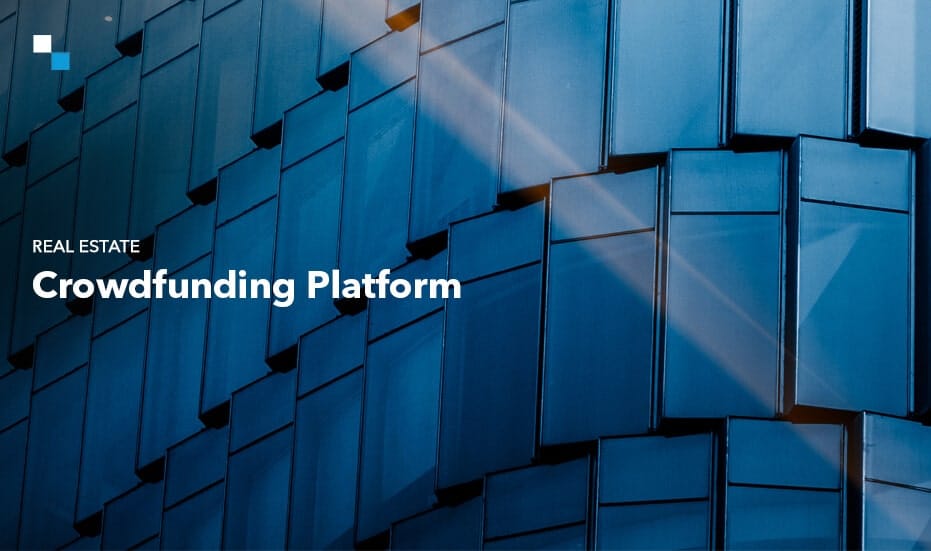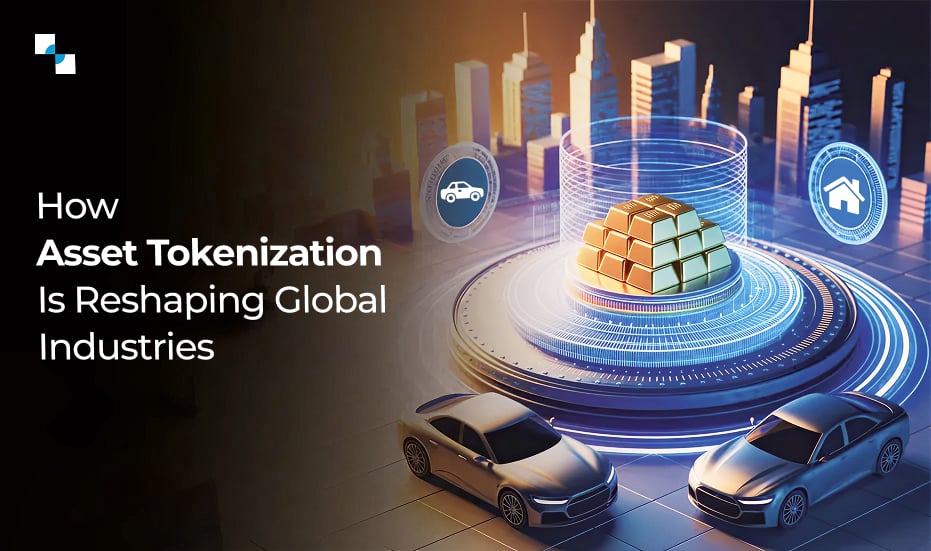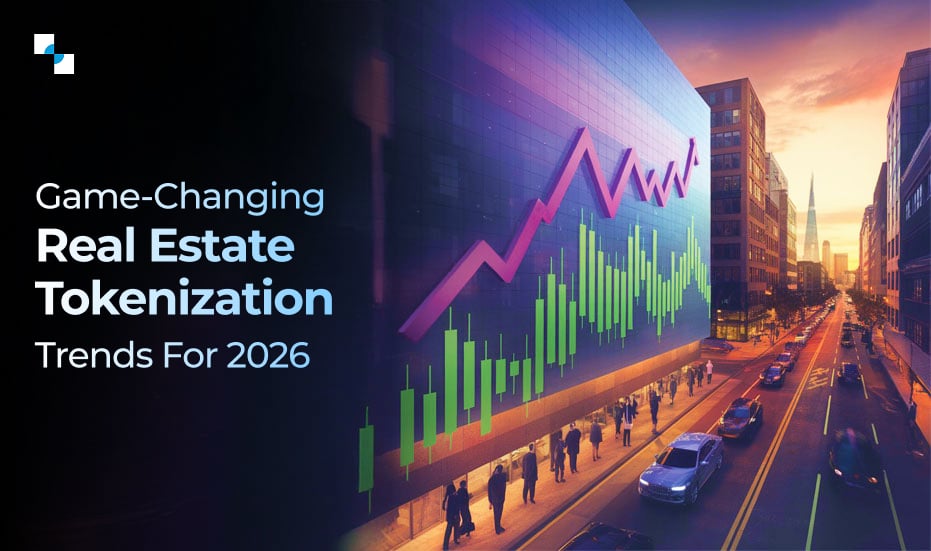Traditionally, real estate investment was a gilded cage, reserved for the privileged few with hefty down payments and insider knowledge. Enter real estate crowdfunding platforms, shattering the exclusivity and reshaping the landscape with every online transaction.
These platforms are democratizing ownership, paving the way for anyone with a few dollars to invest in lucrative properties, previously only accessible to high-net-worth individuals and the market is booming:
What Exactly is Real Estate Tokenization Crowdfunding?
Real Estate Tokenization Crowdfunding refers to the process of using blockchain technology and tokenization to raise funds for real estate projects from a large number of investors. This innovative approach combines the principles of crowdfunding, where funds are collected from a broad group of individuals, with tokenization, which involves representing real-world assets as digital tokens on a blockchain. It’s not surprising that the global real estate crowdfunding market is projected to reach a staggering USD 86.9 billion by 2027, growing at a CAGR of 58.1%.
Let’s dive deep into it:
Real Estate Tokenization: Assets, such as real estate properties, are converted into digital tokens. Each token represents a share or ownership stake in the underlying property. These tokens are then recorded and managed on a blockchain, providing transparency, security, and ease of transfer.
Crowdfunding: Instead of relying on a single or a few large investors, crowdfunding involves collecting smaller contributions from a large number of individuals. This democratized funding model allows a more diverse group of investors to participate in real estate projects.
Why Build Your Own Real Estate Tokenization Crowdfunding Platform?
With this explosive growth, the opportunity to carve your niche in this dynamic market is ripe. Here are some compelling reasons to consider building your own real estate crowdfunding platform:
Untapped Potential
- Niche Opportunities: While giants like Fundrise and RealtyMogul hold their ground, there’s room for niche players. Focus on underserved sectors like green real estate, micro-investments, or specific geographic regions to attract untapped investor segments.
- Innovation Playground: Develop unique features like AI-powered property evaluations, personalized investment recommendations, or gamified investment experiences to differentiate yourself from existing platforms.
High Returns & Diversification
- Competitive Returns: Offer investors access to high-potential properties they might not be able to afford individually, unlocking lucrative opportunities with potentially higher returns than traditional investments.
- Portfolio Power: Provide diversified portfolios across various property types and locations, spreading risk and mitigating the impact of market fluctuations on individual investments.
Financial Inclusion
- Democratize Access: Open the door to real estate investment for individuals with limited capital. Your platform can empower people to build wealth and achieve financial independence, regardless of their current financial status.
- Break Down Barriers: Eliminate entry barriers like high down payments and complex financial structures, making real estate investment accessible to a broader range of participants.
Key Features of Tokenization Crowdfunding Platforms
Here are some of the important features of tokenization crowdfunding platforms:
Blockchain Integration
The backbone of any real estate tokenization crowdfunding platform is blockchain technology. Ethereum, Binance Smart Chain, and other blockchain networks are commonly used for their smart contract capabilities and security features.
Smart Contracts
Smart contracts are self-executing contracts with the terms of the agreement directly written into code. These contracts automate processes such as token issuance, dividend distribution, and ownership transfers, eliminating the need for intermediaries. These are of utmost importance in a real estate tokenization platform.
Security Tokens
Tokenized assets are often represented as security tokens, ensuring compliance with regulatory frameworks. These tokens offer legal protection to both issuers and investors.
KYC/AML Compliance
Know Your Customer (KYC) and Anti-Money Laundering (AML) procedures are integrated to comply with regulatory requirements. It ensures that only authorized and verified investors participate in crowdfunding campaigns.
Liquidity and Secondary Markets
Tokenization enhances liquidity by enabling investors to buy and sell tokens on secondary markets. This feature provides flexibility for investors who wish to exit their positions before the property is sold.

Development Process of Real Estate Tokenization
The development process of a real estate tokenization crowdfunding platform is as follows:
Feasibility Study
Before development begins, a thorough feasibility study is conducted to assess market demand, regulatory compliance, and potential risks. This stage also involves choosing the appropriate blockchain network for the platform.
Legal Compliance
Engaging legal experts to navigate the complex regulatory landscape is crucial. Compliance with securities laws and property regulations is essential to ensure a secure and legally sound platform.
Blockchain Development
Developers create the core infrastructure of the platform using blockchain technology. Smart contracts are coded to automate various processes, and security measures are implemented to protect user data and transactions.
User Interface (UI) and User Experience (UX)
An intuitive and user-friendly interface is designed to attract and retain users. The platform should provide easy navigation, detailed property information, and a seamless investment process.
Integration of Payment Gateways
Payment gateways are integrated to facilitate transactions using both cryptocurrencies and traditional fiat currencies. This step ensures accessibility for a broader range of investors.
Testing and Quality Assurance
Rigorous testing is conducted to identify and fix any bugs or vulnerabilities. This includes security audits, performance testing, and user acceptance testing.
Launch and Marketing
After successful testing, the platform is launched to the public. Marketing efforts are crucial to attract investors and create awareness about the benefits of real estate tokenization.
Real-life Examples of Real Estate Tokenization Platforms
There are several real-world examples of real estate tokenization crowdfunding platforms, showcasing the increasing popularity and diverse applications of this innovative approach. Here are a few noteworthy examples:
Brickblock
This German platform focuses on tokenizing high-value commercial properties, allowing investors to purchase fractions of ownership through their BBK token. Brickblock has successfully tokenized several office buildings and hotels, offering investors attractive returns and improved liquidity compared to traditional real estate investments.
RealT
Based in the US, RealT targets residential properties, tokenizing individual homes and enabling fractional ownership through their RLT token. They prioritize investor protection and regulatory compliance, making them a popular choice for those new to real estate tokenization.
Harbor
Harbor is a broader platform for tokenizing various assets, including real estate. They allow accredited investors to participate in diversified portfolios of tokenized properties through their REALT token. Their focus on curated investment opportunities with strong risk profiles attracts investors seeking alternative investments with growth potential.
Slice
This platform emphasizes accessibility by targeting smaller residential properties and micro-investments. Slice allows users to purchase “slices” of ownership for as little as $100, making real estate investment accessible to a wider audience.
AspenCoin
This project focused on tokenizing a luxury ski resort in Colorado, offering investors fractional ownership with access to resort amenities and potential revenue sharing. Although facing some regulatory hurdles, AspenCoin demonstrates the potential of tokenization for unique and high-profile real estate assets.
Final Words
The real estate crowdfunding landscape is a gold rush unfolding before our eyes, ripe with untapped potential for both investors and entrepreneurs. If you’re driven by innovation, passionate about democratizing access, and have the vision to carve your niche in this booming market, then building your own real estate crowdfunding platform might just be the adventure you’ve been searching for.
This isn’t just about brick-and-mortar investments; it’s about building a bridge between traditional finance and a future where anyone, anywhere, can own a piece of the property pie. It’s about empowering individuals, fueling financial inclusion, and shaking up an industry long overdue for disruption. Get in touch with a reputed Real Estate Tokenization Development Company like Antier to transform your vision into reality.







